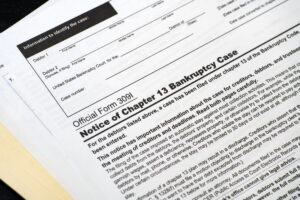What Is Involuntary Bankruptcy?
While not common in personal bankruptcy for people with primarily consumer debt, the Bankruptcy Code does allow creditors to force individuals into Chapter 7 bankruptcy.
Bankruptcy Code Section 303(b)(1) states that an involuntary case can be commenced against a person by the filing of a petition by “three or more entities, each of which is either a holder of a claim against such person that is not contingent as to liability or the subject of a bona fide dispute as to liability or amount, or an indenture trustee representing such a holder, if such noncontingent, undisputed claims aggregate at least $14,425 more than the value of any lien on property of the debtor securing such claims held by the holders of such claims.”
What this means is that at least three creditors will have to coordinate their efforts to force you into bankruptcy. As I mentioned before, this is not a common tool used by creditors. However, if creditors believe that you are hiding assets, involuntary bankruptcy can be useful to compel someone to disclose what assets they have.
If you are concerned about creditors filing involuntary bankruptcy, you should talk to a lawyer right away. Filing bankruptcy can put you in the driver’s seat in restructuring your financial life.


